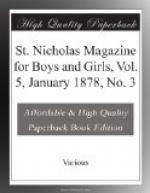Charley Brush lay under an apple-tree, face downward, and absorbed in “The Red Rover,” a book he had read at least ten times before. Stories about ships and sea-life and freebooters and buccaneers were his favorite reading, and, unfortunately, what with illustrated papers and cheap novels, and so-called “Boys’ books,” plenty of such tales abound nowadays. I say unfortunately, for beside teaching him nothing, these books made Charley utterly dissatisfied with his life at home. Hoeing vegetables, chopping wood, and going to the district school, seemed dull work indeed to a boy who was longing to stand sword in hand on a blood-stained deck, in a gory uniform trimmed with skulls and cross-bones, and order his enemies to be thrown one by one into the sea. “The shark awaits your car-casses!” spouted the imaginary desperado with a vicious snap of his teeth; and when Aunt Greg interrupted by asking him to bring in an armful of kindling, he glared at her like the Red Rover himself. Poor Aunt Greg! how little she guessed what was passing in his mind!
“You look real pale to-day,” she said. “I was afraid all that mince-pie for supper would be bad for you. Here, Charley, I’ll mix you some ginger-and-water. That’ll settle you, and make all right again.”
“Mis-cre-ant!” was what Charley yearned to say, but instead he muttered, gruffly, “I aint sick, and I don’t want no ginger.” Very bad grammar, as you perceive; but grammar seemed such an unnecessary accomplishment for a would-be buccaneer, that Charley never could be induced to pay the least attention to it.
That afternoon, under the apple-tree, he made up his mind. A pirate he must and he would be, by fair means or by foul. He was cunning enough to know that the very word “pirate” would frighten his grandmother into fits, so he only asked her leave to go to sea. Going to sea was, to his mind, a necessary first step toward the noble profession he desired to enter.
“I want to so bad,” he whined. “Please say I may.”
Grandmother began to cry. Aunt Hitty was sure he must be out of his mind, and ran for the Epsom salts. Aunt Greg quoted, “There’s no place like home,” and told a story about a boy she once heard of who ran away to sea and never came back, “foundered or drowndered,” she couldn’t remember which. Aunt Prue seized his shoulders and gave him a sound shake. This was what came of idling over story-books all day long, she said,—he could just shut up and go and give the pig its supper, and not let her hear any more trash like that—making them all feel so bad about nothing.
Charley twisted his shoulder out of her grasp with a scowl, but he took the pail and went out to the pen. All the time that piggy ate, he was considering what to do. “I’ll tease ’em,” he decided, “and tease and tease, and then they’ll let me go.”
So he did tease, and plead and expostulate, but it was all in vain. Grandmother and the aunts could not be reached by any of his entreaties, and at the end of a week he seemed as far from his desire as ever.




